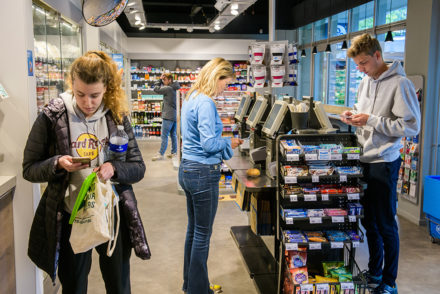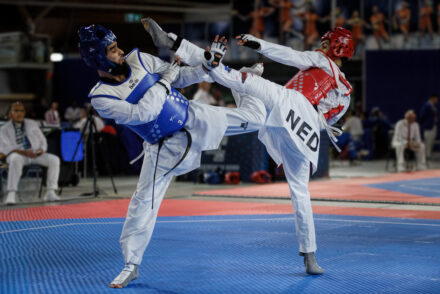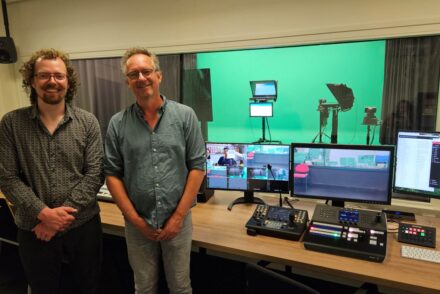Minister of Defence Ruben Brekelmans: ‘I completely lost all motivation for my thesis’
Ruben Brekelmans was an ambitious student pursuing two degrees simultaneously in Tilburg. But he also made time for fun with his friends: ‘We had two favorite pubs: Bolle and Brandpunt.’ Twenty years later, as the Minister of Defence, Brekelmans is primarily concerned about Dutch freedom and security: ‘They are under immense pressure.’

For nearly 200 years, the Ministry of Defence has been housed in the same building in The Hague. Built in 1746, the stately structure exudes history. Along the hallway leading to Ruben Brekelmans’ (1986) office hang portraits of his predecessors: black-and-white images of the earliest officeholders, transitioning to color photos of more recent leaders like Hans van Mierlo and Frits Bolkestein. The only picture missing is that of Brekelmans’ direct predecessor, Kajsa Ollongren. We meet with Brekelmans in late October, the week he marks his first 100 days as Minister of Defence.
In the past 100 days, you’ve traveled half the globe and met various key players on the international political stage, including Ukrainian President Zelensky. Was this the type of career you envisioned when you started your studies?
‘Well, I did foresee a potential future in politics, as I was already active in the JOVD, the VVD’s youth organization, during my student days in Tilburg. But I studied economics, so that career path seemed more likely. Becoming Minister of Defence, however, wasn’t something I anticipated at the time.’
Why did you choose economics back then?
‘When I was in high school and living in Kaatsheuvel, my father started a business. It initially did well, but then an economic crisis in the U.S. in the early 2000s spilled over into the Netherlands. I saw how severely it impacted my father’s company. I wondered how a crisis starting so far away could have such a profound effect on a small local business like his. I wanted to understand those connections, which led me to study economics.’
What kind of student were you?
‘I was very ambitious. I pursued multiple degrees simultaneously and worked hard to achieve good grades. I also wanted to develop myself more broadly, so I joined the board of the JOVD in Tilburg and organized a climate change conference as part of a committee for the precursor to Asset.
‘Additionally, I served on the economics program board for several years and even taught economics courses at the social sciences faculty. But I also made plenty of time for socializing, often going out with friends at Korte Heuvel. On Piusplein, we had two favorite pubs: Bolle and Brandpunt.’
You managed to do all that simultaneously?
Laughing: ‘Well, it wasn’t easy; it required a lot of hard work. The great thing about being a student is having the freedom to pursue what interests you. On the one hand, I studied general economics to understand how economies function. On the other hand, I studied business economics because I knew there was a strong chance I’d work in the corporate world.
‘While studying, I realized there were significant gaps in my understanding of the world. So I immersed myself in politics as well. But I didn’t want to be entirely dependent on a political career in the future, which is why I engaged in so many other activities.’
You mentioned socializing earlier. What’s the first thing that comes to mind?
‘I still keep in touch with friends I made during the introduction week. They’ve remained close friends ever since. We meet about twice a year, and it’s always like old times.’
Smiling: ‘We used to play drinking games with cards, accompanied by cheesy 90s music in the background. These days, when we get together, it’s clear we’ve gotten older. The next day hurts more, too.’
Were there any subjects or professors that particularly inspired you?
‘What stands out are the Social Economic Policy lectures by Ad Kolnaar. He made the connection between macroeconomics and its implications for government policy. He was brilliant at translating theory into concrete policy. Kolnaar was also a member of the Dutch Social and Economic Council (SER) for 20 years, active within the CDA, and an advisor in the field. His practical approach in lectures aligned perfectly with my reason for studying economics—I wanted to truly understand it.’
And were there any Monday morning classes you skipped?
‘That would be Friday mornings, right? But no, I didn’t skip classes. I was less interested in marketing and business law. Economics became increasingly technical and mathematical, leaning more toward econometrics. At that point, I really missed the political courses. I thought: I’ve learned to analyze things through an economic lens, but so much happens in the world that this perspective alone doesn’t capture. That’s why I pursued a year of Global Politics in London after my economics degree.’
You also studied public administration at Harvard in the United States after London. What did studying abroad add compared to studying in the Netherlands?
‘In London, I gained a lot of knowledge and broadened my horizons. I also became more of a global citizen because you’re immersed in a highly international environment. After that, I worked for three years at Boston Consulting Group (BCG), an international consulting firm. I learned a great deal there, but when I returned to the VVD, I realized that politics worked very differently from the corporate world.
‘This made it clear what I still needed to learn if I wanted to fully transition into politics in the future. So, in addition to theoretical courses, I took applied courses on leadership, persuasion, and writing and presentation skills. These are all things you don’t typically learn in theoretical programs in the Netherlands but are incredibly useful in everyday work.’
How does the culture at an American university like Harvard differ from that at Tilburg University?
‘Studying there is a major investment. People come from all over the world, often bringing their partners or families. The mindset is: I’m here to learn something specific and to contribute in a targeted way. Ask what you can do is the motto of the Harvard Kennedy School, and everyone lived by that ethos.
‘In contrast, if you ask first-year students in the Netherlands why they chose their studies, they often say it’s because it “seems fun” or because they weren’t sure what else to pick. That creates a very different atmosphere at a university.’
What’s the most valuable thing you’ve taken away from your time in Tilburg?
‘The analytical way of thinking I developed through my economics studies, as I’ve been able to apply that skill everywhere since. Tilburg University was also a great place to grow personally as an 18-year-old and to build lifelong friendships.’
Is there anything you would have done differently in hindsight?
‘I took a long time to finish my master’s thesis. I was working on my master’s in economics and bachelor’s in business economics simultaneously, and I thought: I’ll write my thesis over the summer before heading to London. That didn’t work out. So I brought the thesis with me to London, but I had no motivation to work on it there. I ended up dragging that thesis along with me for a year and a half, and it was a burden during that period.’
You live in Oisterwijk, near Tilburg. After returning from work visits to war and conflict zones, do you see your own freedom and safety—and that of your family—differently?
‘Absolutely. After my student years, I traveled a lot and visited places like Cuba, Iran, and North Korea. Seeing those environments firsthand gives you a stark sense of how different the world can be. Back then, I sought out those experiences deliberately. Now, it’s more apparent because we see the consequences of Russian aggression every day.
‘My partner and I made a conscious decision to move back to Brabant. We both grew up there and want our children to grow up there too. Especially with the awareness that our way of life—living in freedom and safety—is truly worth protecting. We now experience daily how important and fragile those freedoms are.’
Would you like to complete the following lyric by Guus Meeuwis? And then I think of Brabant because there…
‘I feel at home.’
CV (Selected)
- 2003–present: Member of VVD
- 2004–2008: Bachelor’s in Business Economics, Tilburg University
- 2004–2010: Bachelor’s and Master’s in General Economics, Tilburg University
- 2008–2009: Master’s in International Politics, London School of Economics and Political Science
- 2013–2015: Master’s in Public Administration, Harvard Kennedy School, Boston
- 2010–2017: Consultant and Project Leader at Boston Consulting Group
- 2017–2019: Political Advisor to the Secretary of State for Justice and Security
- 2021–2024: Member of Parliament for the VVD
- 2024–present: Minister of Defence






